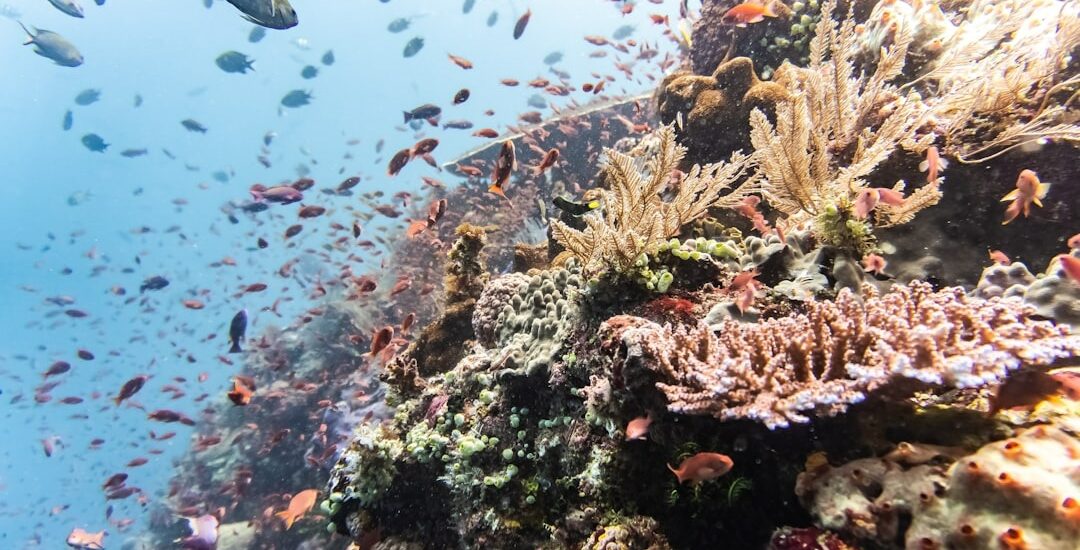The Rainbow Forest Beneath the Waves
When we think of forests, we imagine towering trees, green leaves, and birds singing in the canopy. But beneath the blue surface of Indonesia’s oceans lies another kind of forest—a rainbow forest made of coral reefs, alive with dazzling fish, dancing plankton, and mysterious creatures that science has barely begun to understand.
Coral reefs are not just beautiful underwater landscapes. They are the foundation of life for millions of marine species and a shield that protects coastlines and humans alike. For Indonesia—home to some of the richest coral reefs in the world—they are also a source of food, culture, livelihood, and hope.
But today, these reefs are under threat. From warming seas to destructive fishing, from pollution to neglect, the vibrant colors of corals are fading, replaced by eerie white skeletons. And when corals die, entire ecosystems unravel.
This is not just an environmental crisis—it is a human crisis.
Indonesia: The Global Epicenter of Coral Diversity
Indonesia sits at the very heart of the Coral Triangle, often called the “Amazon of the Seas.” Stretching from the Philippines to Timor-Leste, this region contains the highest diversity of marine life on Earth.
🔹 Statistics that show Indonesia’s global importance:
- Indonesia has more than 17,000 islands, fringed by about 51,000 km² of coral reefs.
- It hosts over 590 species of reef-building corals—that’s 76% of the world’s total.
- Over 2,000 species of reef fish thrive here, many found nowhere else.
- Some areas, like Raja Ampat in Papua, are recognized as the most biodiverse marine ecosystem on the planet, with over 550 species of corals in a single reef system.
From the shores of Bali to the depths of Maluku, from Manado’s Bunaken National Park to West Nusa Tenggara’s Gili Islands, these reefs are living treasures of Indonesia.
The Benefits of Coral Reefs: Why They Matter for All of Us
Coral reefs are often described as the “lungs of the sea.” But their value extends far beyond the water.
1. Biodiversity: Home of Ocean Life
- Coral reefs support about 25% of all marine species.
- Fish, mollusks, crustaceans, sea turtles, and even sharks depend on reefs for shelter and food.
- Tiny plankton, invisible to the human eye, thrive here—and plankton, in turn, produce 50% of the oxygen we breathe.
2. Food Security: Feeding Millions
- More than 120 million Indonesians rely on fish as their main source of protein.
- Coral reefs are breeding grounds for tuna, snapper, grouper, and countless species vital to local diets.
3. Coastal Protection: Natural Shields
- Healthy coral reefs act as barriers against waves, tsunamis, and storms, absorbing up to 97% of wave energy.
- Without reefs, coastal villages would face devastating floods and erosion.
4. Economy and Tourism
- Reef tourism (diving, snorkeling, eco-travel) generates billions of dollars annually in places like Bali, Gili Islands, and Manado.
- Local fishermen and communities depend on reefs for sustainable livelihoods.
5. Medicine and Human Health
- Corals and marine organisms are sources of new medicines, including treatments for cancer, infections, and inflammation.
- The next breakthrough in healthcare might be hiding in a coral reef.
The Tragedy: Coral Reefs Under Threat
Despite their importance, Indonesia’s coral reefs are disappearing at alarming rates.
The Facts:
- A study by Indonesia’s Ministry of Marine Affairs and Fisheries (2020) found that only 6.5% of reefs are in “excellent” condition, while nearly 30% are severely damaged.
- Global warming has caused mass bleaching events, where corals lose their vibrant colors and starve.
- Coral cover in many popular areas, like Bali and Lombok, has declined by more than 50% over the last 30 years.
Main Causes:
- Climate Change & Ocean Warming
- Rising sea temperatures stress corals, causing bleaching.
- In 2016, up to 85% of corals in some Indonesian reefs bleached due to El Niño.
- Overfishing & Destructive Fishing
- Blast fishing and cyanide poisoning kill corals instantly.
- Overharvesting of reef fish disrupts ecosystems.
- Pollution
- Plastic waste smothers reefs.
- Agricultural runoff causes algae blooms that suffocate corals.
- Coastal Development & Tourism Pressure
- Hotels and ports destroy reef habitats.
- Unregulated tourism (anchors, divers, sunscreen chemicals) damages fragile corals.
Human and Environmental Consequences
For People:
- Decline in fish stocks threatens food security for millions.
- Loss of reef protection increases coastal flooding risks.
- Collapse of reef tourism means job losses for thousands of Indonesians.
For Nature:
- Coral loss equals habitat loss for thousands of species.
- Ocean balance collapses: algae overtakes reefs, reducing oxygen and plankton.
- Marine mammals, turtles, and seabirds suffer as food chains disintegrate.
Stories from Indonesia’s Coral Reefs
- Bali (Tulamben & Nusa Penida): Once vibrant dive spots, many corals now show bleaching scars. Yet, community-led restoration projects are giving hope, with artificial reef structures helping baby corals grow again.
- Manado (Bunaken National Park): A diver’s paradise, still home to 390 species of corals. But pollution from nearby cities threatens its survival. Local schools now teach “ocean literacy” to children to instill protection from an early age.
- Maluku Islands: Known for untouched reefs, many villages still rely directly on coral ecosystems for food. Here, traditional wisdom like sasi laut (seasonal fishing bans) has preserved marine resources for centuries.
- Papua (Raja Ampat): A jewel of the planet, where coral cover remains among the best in the world. But increasing tourism, if unmanaged, could place pressure on fragile ecosystems.
- West Nusa Tenggara (Gili Islands): Once heavily damaged by bomb fishing, locals have pioneered coral restoration, planting thousands of fragments on underwater structures. Today, marine life is slowly returning.
What We Must Do to Save Coral Reefs ?
The decline is not inevitable. With global and local action, reefs can recover.
1. Marine Protected Areas (MPAs)
- Expand no-fishing zones to allow coral and fish recovery.
- Strengthen enforcement against illegal fishing.
2. Community-Led Conservation
- Support traditional wisdom like sasi laut in Maluku.
- Train local fishermen in sustainable fishing.
3. Reef Restoration
- Use artificial reefs and coral gardening to rebuild damaged areas.
- Example: The Biorock technology in Bali has shown significant success.
4. Education and Awareness
- Teach coastal communities the value of reefs.
- Encourage eco-tourism that funds conservation instead of harming reefs.
5. Global Climate Action
- Reduce carbon emissions to limit ocean warming.
- Promote renewable energy and reduce reliance on fossil fuels.
What You Can Do ?
- As a Traveler: Choose eco-friendly diving operators. Never touch corals. Use reef-safe sunscreen.
- As a Consumer: Support sustainable seafood. Reduce plastic use.
- As a Global Citizen: Donate to reef conservation projects, spread awareness, and support climate policies.
At Grow Foundation, we are committed to protecting Indonesia’s coral reefs by working with local communities, supporting reef restoration, and educating the next generation about ocean stewardship.
Nature’s Power to Heal
Coral reefs are fragile, but they are also resilient. Studies show that when given protection, corals can recover within a decade. In Raja Ampat, reefs are flourishing because communities and authorities worked together to protect them. In the Gili Islands, once barren seabeds are alive again thanks to restoration projects.
The ocean wants to heal—it just needs us to stop hurting it.
Our Shared Responsibility
Imagine diving in Bali and seeing corals glowing like rainbows. Imagine fishermen in Maluku catching enough to feed their families without harming the sea. Imagine children in Papua inheriting oceans that are alive, not dead.
This is the future we must fight for.
Coral reefs are not just “out there” in the sea—they are part of our survival. They give us oxygen, food, protection, beauty, and hope. Losing them would be one of humanity’s greatest tragedies.
But saving them can be one of our greatest victories.
🌊 Let us rise together for the reefs. For Indonesia. For humanity. For life itself.





